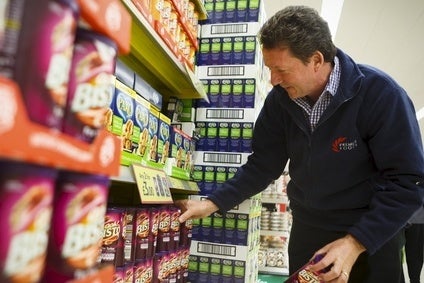
Rationalisation of SKUs and innovation will continue to form a big part of Premier Foods plc's focus for 2015, CEO Gavin Darby has said.
The UK food group yesterday (19 May) company posted a fall in annual profits amid pressure on sales.

Discover B2B Marketing That Performs
Combine business intelligence and editorial excellence to reach engaged professionals across 36 leading media platforms.
Sales fell 4.6% to GBP504.4m (US$784.1m) and trading profit fell 6.4% but Premier said the results were "in line with expectations".
The company pointed to a now commonly known fact; the larger supermarkets in the UK – its main customers – have struggled as discounters continued to capture market share in the last year.
However, that trend is changing, Darby said, and Premier is shaping itself up to support and benefit from the rebound of the supermarkets, something he alluded to earlier this year.
Over the past 18 months, the Mr Kipling owner has trimmed 700 of 1,700 SKUs from its business and Darby insists that has been the right move to help the company drive growth, especially as the larger retailers in the UK make similar considerations to open up shelf-space for top selling products.

US Tariffs are shifting - will you react or anticipate?
Don’t let policy changes catch you off guard. Stay proactive with real-time data and expert analysis.
By GlobalData"It is significant, some may say quite brutal, housekeeping," said Darby. "As our retailers head down that road, we should only benefit because the brands and SKUs left will have more space and availability to grow faster."
Premier is trying to align its strategy with that of its largest customers. Tesco is reviewing its ranges and some household of brands have suffered, including Lactalis-owned Rachel's Organic yoghurt and Associated British Foods' Kingsmill bread.
Darby said he was "happy to support" the retailer's vision of rationalisation.
"With Tesco specifically, they're doing a major range review and planning to do that across the whole company in August and so they're in the process of working their way through that with us. The vision I have ultimately is…they are bold and in their case take 15-20% of their SKUs out and redistribute the very same space. The space that's left when you take 15-20% out of categories will get distributed on remaining brands – they'll get more presence, space and go out of stock. I think brands that are strong – number one and two – in their categories will be in better distribution and we will all benefit."
Premier will continue to trim under-performing brands from its portfolio. While the company is "largely where it needs to be" in terms of its portfolio, Darby said the rationalisation would help make way for new products.
Over the next year, the company is adding variants for its Mr Kipling and Cadbury ranges, and, in a bid to align itself with the evolving retail environment, is tailoring its offering accordingly.
"Multichannel, multiformat is here to stay," Darby said. Premier is, for example, introducing different pack sizes for its Mr Kipling cakes. Where previously the product was only available in a six-pack, it will now be available in a two-pack targeting consumers are more likely to seek out an on-the-go snack. The same product is available in a nine-pack format for hypermarkets and supermarkets for consumers who want to keep them for future occasions.
Within its grocery segment, Premier said it is putting "real focus and energy into understanding the consumer" and would "take advantage" of the growing need for more convenience and hob cooking. Here it will be innovating in its use of technology. For example, the gel technology it uses in its Bisto seasonings and flavourings has been transferred to other brands such as Loyd Grossman and Sharwood's.
"It's about taking technology and leveraging it in other categories. So we'll see a pipeline of innovation," Darby said.
Over the last financial year, Premier claims to have doubled its rate of innovation compared with the previous year. It plans to double that again.
"We are absolutely crystal clear that to drive categories and provide value for categories we need to significantly step up the rate of innovation. That is a journey we are on," said Darby.
But is there a danger this plan for ongoing rationalisation may stifle creativity?
Darby said Premier was happy to add to its portfolio through innovation. Its Mr Kipling stack pack was an example of "adding some good complexity".
"We are happy to add through innovation and NPD but it has to be a net number. We will continue to house-keep out other SKUs so we can stay roughly in the position we are in. I see de-complexity or simplicity in retailers as a significant opportunity. We embarked on that journey 18 months before our customers did. We feel in very good shape."
Shore Capital analyst, Clive Black, backed Premier's shift to a "simpler" structure.
"The major retailers are seeking to reduce costs, particularly in the supply chain. Accordingly, in the world of proprietary brands we believe that Premier, with its somewhat nostalgic British ambient lines, can benefit from programmes such as SKU rationalisation and a focus upon simplified channels with longer production runs and lower unit costs that Sainsbury, Tesco and Morrisons speak of extensively at this time. Indeed, in the case of Premier, the business had commenced a programme of SKU rationalisation and production simplification well before the supermarkets (43% reduction over the last couple of years), positioning the business well to our minds."





